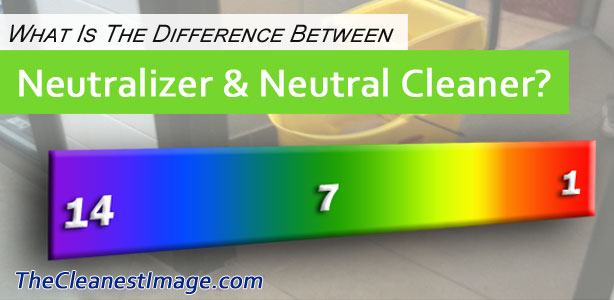It seems floor neutralizer and neutral floor cleaner gets confused a lot. Using the correct product, in the correct manner, can save you hours of hard work and frustration.
For years, I have heard the terms “neutralizer” used to describe a general purpose floor cleaner, which would be incorrect. Like wise, there are many cleaners that use a “neutral floor cleaner” when they should be using a neutralizer. Here are the correct uses for each. It all comes down to the pH of the cleaner.
Neutral Floor Cleaners
A neutral floor cleaner describes a cleaning solution that is pH neutral or a 7 on the pH scale. It is neither an acid or alkaline, there for will not damage any surface that is safe to use water on. Water is, in fact, neutral. Cleaners that are neutral can still be very effective cleaning products.
Floor cleaning chemicals use the term neutral most often, indicating that it will not damage floor finish. Floor finish stripper generally is on the alkaline side of the pH scale, or greater than 7. This is useful when removing floor finish, but can cause problems if your are just wanting to clean the floor or if your skin is exposed to it. Alkaline cleaners can be very dangerous.
On the other side, acidic cleaning chemicals are used to remove minerals and heavy organic matter. For example, an acid toilet bowl cleaner can be used to remove scale from the porcelain of a toilet or sink. It can also damage chrome fixtures as well as cause health concerns for the users. These products should be used sparingly.
Floor Neutralizer
When a cleaner is called a floor neutralizer, it means that it is anything but neutral. In the cleaning world, a cleaning chemical that is termed a “neutralizer” will most often be acidic or in the pH range of 2. This is because neutralizers are used to bring alkaline liquids or residues back to a pH of 7 or neutral.
You can even get floor neutralizer shipped to you in dry water soluble packets from Amazon.
Examples Of When To Us A Floor Neutralizer
To remove salt residue from floors
Removing salt residue from floors can be very frustrating. Because salt is highly alkaline, a normal floor cleaner is ineffective. The dirt just smears around the floor and becomes a sticky mess. But when an floor neutralizer is used, the alkaline residue is easily removed. This can also help remove salt residue from carpeting as well.
Rinse carpets with floor neutralizer
Many carpet cleaning chemicals are, at least, slightly alkaline. When a carpet is cleaned with an extractor, any water left in the carpet also contains the cleaning chemical. Once the moisture evaporates, a chemical residue is left behind and causes the fibers to be sticky. By rinsing the carpet with a neutralizer, the chemical residue is removed and reduces the opportunity for re-soiling.
To prepare a newly stripped floor for re-finishing
When you use a chemical floor stripper, there is a certain amount of residue left behind on the floor. This film, if not removed, will damage new floor finish. There have been many floors that have had to be completely redone because of stripper residue.
As I mentioned above, floor stripper is highly alkaline. In order to make sure that all of the residue has been removed, it is a good idea to rinse a floor immediately after stripping with a neutralizer, then rinse again with plain water. I suggest using an automatic floor scrubber for the final, clear water rinse.
Understanding The Difference
When you understand the difference between a neutralizer and a neutral cleaner, floor care becomes much easier. If you are able, test the area that needs to be cleaned with pH testing paper. This will help you make the right cleaning chemical choice.
As with any cleaning chemical, make sure to read all labels and use as instructed. It is also a good idea to check with the floor manufacturer about the types of cleaning chemicals they suggest as well. Some flooring warranties can be voided by using the wrong cleaning products. Always better safe than sorry.
